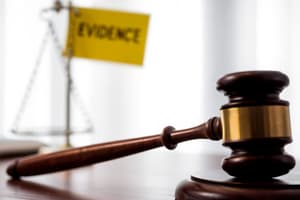Podcast
Questions and Answers
Which of the following professions may need to understand the Law of Evidence?
Which of the following professions may need to understand the Law of Evidence?
- Scientists
- Lawyers
- Journalists
- All of the above (correct)
The Law of Evidence only concerns the admissibility of evidence in court and not how it is collected.
The Law of Evidence only concerns the admissibility of evidence in court and not how it is collected.
False (B)
According to the Appellate Division in Tregea and Another v Godart and Another, what is the Law of Evidence?
According to the Appellate Division in Tregea and Another v Godart and Another, what is the Law of Evidence?
A set of rules which has to do with judicial investigations into questions of fact.
The law of evidence is often considered as '______' law due to its specialized nature.
The law of evidence is often considered as '______' law due to its specialized nature.
Match the component of the rules of evidence with its function:
Match the component of the rules of evidence with its function:
According to the notes, what does the Law of Evidence prescribe?
According to the notes, what does the Law of Evidence prescribe?
Questions of law deal with behaviors.
Questions of law deal with behaviors.
Why is it important to answer questions of fact as well as questions of law in a case?
Why is it important to answer questions of fact as well as questions of law in a case?
According to the notes, the Law of Evidence today focuses mainly on the ______ and integrity of the fact-finding process.
According to the notes, the Law of Evidence today focuses mainly on the ______ and integrity of the fact-finding process.
Match the following case law to its legal principle.
Match the following case law to its legal principle.
The Law of Evidence, as we know it today, is known as the:
The Law of Evidence, as we know it today, is known as the:
The rules governing the collection, storing, and presenting of facts are unique to the legal discipline.
The rules governing the collection, storing, and presenting of facts are unique to the legal discipline.
What is one influence on South Africa's law of evidence besides British rule?
What is one influence on South Africa's law of evidence besides British rule?
James Fitzjames Stephen distilled the Law of Evidence into three components: Relevance (admissibility), Presentation, and ______.
James Fitzjames Stephen distilled the Law of Evidence into three components: Relevance (admissibility), Presentation, and ______.
Match the South African litigation environment with its characteristics:
Match the South African litigation environment with its characteristics:
Which act allowed the strict English rules of hearsay evidence to change to a more flexible system in South Africa?
Which act allowed the strict English rules of hearsay evidence to change to a more flexible system in South Africa?
A court must always follow precedent, even if it contradicts the Constitution.
A court must always follow precedent, even if it contradicts the Constitution.
After the four colonies became the provinces of the Union of South Africa, what was criminal procedure consolidated into?
After the four colonies became the provinces of the Union of South Africa, what was criminal procedure consolidated into?
According to the notes, local courts developed a system of precedent with respect to the law of evidence in criminal proceedings to clarify the meaning of the '______' provision.
According to the notes, local courts developed a system of precedent with respect to the law of evidence in criminal proceedings to clarify the meaning of the '______' provision.
Match the following definitions related to Section 35 rights:
Match the following definitions related to Section 35 rights:
Before the advent of the Constitution, what kind of police docket privilege was typically applied?
Before the advent of the Constitution, what kind of police docket privilege was typically applied?
According to Shabalala v Attorney General Transvaal, the blanket police docket privilege is constitutional.
According to Shabalala v Attorney General Transvaal, the blanket police docket privilege is constitutional.
In Matlou v S, what did the court admit as evidence, despite it being obtained by unconstitutional means?
In Matlou v S, what did the court admit as evidence, despite it being obtained by unconstitutional means?
S217(1)(b)(i)-(ii) of CPA is concerned with confessions before a ______.
S217(1)(b)(i)-(ii) of CPA is concerned with confessions before a ______.
Match the rule with its definition:
Match the rule with its definition:
Evidence obtained through a Bill of Rights violation should be excluded if:
Evidence obtained through a Bill of Rights violation should be excluded if:
Evidence obtained in violation of the Bill of Rights is automatically excluded.
Evidence obtained in violation of the Bill of Rights is automatically excluded.
What is adjective law also known as?
What is adjective law also known as?
The legal rules setting out the rights and duties of the parties are known as ______ Law.
The legal rules setting out the rights and duties of the parties are known as ______ Law.
Match the type of law with its origin:
Match the type of law with its origin:
In Tregea v Godart, the question before the court was:
In Tregea v Godart, the question before the court was:
Irrebuttable presumptions are part of adjective law
Irrebuttable presumptions are part of adjective law
What does it mean when a person is ‘estopped’?
What does it mean when a person is ‘estopped’?
In terms of parol evidence rule, when parties enter into a written agreement, the original document is the ______ source of the contractual terms.
In terms of parol evidence rule, when parties enter into a written agreement, the original document is the ______ source of the contractual terms.
Match the division of parol evidence rule with its definition:
Match the division of parol evidence rule with its definition:
As a general rule, courts rely on:
As a general rule, courts rely on:
Extrinsic evidence is excluded because of an exclusionary rule.
Extrinsic evidence is excluded because of an exclusionary rule.
According to the list of concepts, how can relevant evidence be excluded?
According to the list of concepts, how can relevant evidence be excluded?
Admissibility questions are usually ______ in nature.
Admissibility questions are usually ______ in nature.
Match the element of the burden of proof for those who introduce the evidence with definition:
Match the element of the burden of proof for those who introduce the evidence with definition:
Material evidence is related to lawsuit without logical regard, so therefore must be related to:
Material evidence is related to lawsuit without logical regard, so therefore must be related to:
Flashcards
What does Evidence include?
What does Evidence include?
Evidence includes how evidence should be collected, presented in court, its admissibility, its weight, and the overall pursuit of justice.
Law of Evidence
Law of Evidence
A set of rules which has to do with judicial investigations into questions of fact.
Questions of Law
Questions of Law
Law is a body of principles/rules capable of being predicated in advance.
Questions of Fact
Questions of Fact
Signup and view all the flashcards
Questions of Fact
Questions of Fact
Signup and view all the flashcards
Role of evidence today
Role of evidence today
Signup and view all the flashcards
Law of Evidence
Law of Evidence
Signup and view all the flashcards
Law of Evidence components
Law of Evidence components
Signup and view all the flashcards
Evidence testing
Evidence testing
Signup and view all the flashcards
Decolonizing Evidence Law
Decolonizing Evidence Law
Signup and view all the flashcards
Facta Probanda
Facta Probanda
Signup and view all the flashcards
Facta Probantia
Facta Probantia
Signup and view all the flashcards
Evidence
Evidence
Signup and view all the flashcards
Argument (on facts)
Argument (on facts)
Signup and view all the flashcards
Brute Facts
Brute Facts
Signup and view all the flashcards
Evidentiary Facts
Evidentiary Facts
Signup and view all the flashcards
Conclusive Proof
Conclusive Proof
Signup and view all the flashcards
Prima Facie
Prima Facie
Signup and view all the flashcards
Admissibility
Admissibility
Signup and view all the flashcards
Probative value
Probative value
Signup and view all the flashcards
Circumstantial Evidence
Circumstantial Evidence
Signup and view all the flashcards
Hearsay Evidence
Hearsay Evidence
Signup and view all the flashcards
Privileged Information
Privileged Information
Signup and view all the flashcards
Formal Admission
Formal Admission
Signup and view all the flashcards
Informal Admission
Informal Admission
Signup and view all the flashcards
Confession
Confession
Signup and view all the flashcards
Judicial Notice
Judicial Notice
Signup and view all the flashcards
Presumptions
Presumptions
Signup and view all the flashcards
Basis of common Law Evidence
Basis of common Law Evidence
Signup and view all the flashcards
Independent SA Evidence Law
Independent SA Evidence Law
Signup and view all the flashcards
Rights in Analysis
Rights in Analysis
Signup and view all the flashcards
Rights to access trial/fairness
Rights to access trial/fairness
Signup and view all the flashcards
Substantive Law
Substantive Law
Signup and view all the flashcards
Adjective Law
Adjective Law
Signup and view all the flashcards
Overview of the facts
Overview of the facts
Signup and view all the flashcards
Evidence is a way to see
Evidence is a way to see
Signup and view all the flashcards
Similar fact evidence
Similar fact evidence
Signup and view all the flashcards
Probativeness of Similar fact
Probativeness of Similar fact
Signup and view all the flashcards
Makin Rule
Makin Rule
Signup and view all the flashcards
Study Notes
Introduction to Law of Evidence
- Members of the SAPS, private investigators, experts, scientists, journalists, and arbitrators need to understand the Law of Evidence, not just lawyers.
- Evidence includes how it should be collected, presented in court, its admissibility, the evaluation of its weight, and the overall pursuit of justice in fact-finding.
- Can be evaluated with regard to the Nature and Subject Matter of the Law of Evidence, The Role of the Law of Evidence today, decolonial analysis, and the 3 Fundamental Features of Coloniality in the South African Law of Evidence
What Law of Evidence Is
- Issue raised historically and ruled on by the Appellate Division in Tregea and Another v Godart and Another.
- It is a set of rules which has to do with judicial investigations into questions of fact.
- Often called "Lawyers' law" due to its specialization and importance for practicing attorneys.
- Rules of Evidence Includes: Gathering, Storing, Retrieving, Transmitting information, and putting this information to inferential use.
- Prescribes which facts may be presented in court, how to prove an issue, who may present a fact or prove an issue, and how this may be done.
Questions of Law vs Fact
- Questions of Law: A body of principles and rules capable of being predicated in advance; exceeding the speed limit is a criminal offense as a matter of law.
- Questions of Fact: Descriptive statements that can be falsified; adjudicative facts relate to activities or characteristics of the litigants, as in whether SAPS read the Miranda rights to the accused,.
- Difference: Questions of law directly discuss whether a rule was transgressed, while questions of fact deal with behaviors and not directly with the rule.
- A matter of law determines if a rule was broken, but a question of fact determines if the person broke the rule willingly or knowingly.
The Role of Law of Evidence Today
- Used by forensic experts with a focus on the fairness and integrity of the fact-finding process.
Case Law
- S v Sigcawu: Determination of the admissibility of the deceased’s dying declaration that identified Khanyiso ‘Kaizer’ Sigcawu as his killer.
- Nxomani v Minister of Police: Evaluation of fairness of the two-year detention of Nxomani based on unreasonable suspicion of involvement in a truck robbery.
- S v Moyeng: Assessment of the impact of destroying trial records on the wrongfulness of Hlabane Moyeng's conviction.
A Decolonial Perspective
- The Law of Evidence is known as the “child of the jury" and introduced by the British colonial government.
- Principles for evidence collection, storing, presentation, and fact evaluation are not unique to it and are found in different disciplines and jurisdictions.
- Xhosa customary law has exclusionary rule and testimony by bribed witnesses.
- South Africa has blended state and traditional courts where principles of evidence and proof are applied.
Influence of the Past
- Important for understanding the Laws of Evidence
The Three Fundamental Features of Coloniality
- James Fitsjames Stephen distilled the Law of Evidence into Relevance (admissibility), Presentation, and Proof (evaluation).
- Taking in the Context of common-law adversarialism where Evidence is tested in cross-examination
- The Procedural bifurcation between the Law of Evidence and Law of Pleadings
- Enlightenment Rationalism: Moved away from trials by ordeals, battle and compurgation and Foremost purpose is finding the truth and doing so fairly.
Relation to South African System
- A large part of South African litigation occurs in traditional courts, not state courts.
- The Adversarial system designed for jury trials was abolished in 1969.
Changes to Decolonize the Law of Evidence
- The Hearsay Evidence, per the Law of Evidence Amendment Act 45 of 1988, changed the strict English rules to better suit South Africa.
- Courts interpret the Law of Evidence Rules with S39(2) of the Constitution, requiring courts to develop common law rules that are consistent with it.
- Courts are not obligated to follow precedent if it conflicts with boni mores or the constitution.
Chapter 2 – Basic Concepts
- Briefly define main basic concepts in the law of evidence to later elaborate further
Chapter 2 Concepts
- Facts in Issue and Facts Relevant to the Facts in Issue
- Evidence and Argument
- Presentation of Evidence and Evidentiary Facts
- Evidence and Proof
- Conclusive Proof and Prima Facie Evidence
- Admissibility and Weight of Evidence
- Circumstantial and Direct Evidence
- Hearsay
- Relevance
- Privilege
- Formal and Informal Admissions
- Confessions
- Judicial Notice
- Presumptions
Facts in Issue and Facts Relevant to the Facts in Issue
- Divided into facta probanda (facts in issue) and facta probantia (facts relevant to the facts in issue).
- Facta Probanda: Essential criteria for the cause of action where a litigant must prove material facts to establish a case.
- Facta Probantia: Evidentiary facts which are subordinate and collateral to facta probanda and the relevance inferred for issues in dispute between the parties
Evidence and Argument
- Evidence: is the advancement of facts including oral testimony, real, documentary, expert evidence, etc.
- Arguments: process of organizing to advance one's case by explaining to the court why certain inferences should be drawn.
Presentation of Evidence and Evidentiary Facts
- 'Evidence' is used interchangeably with Brute Facts (facts that have no explanation) and Evidentiary Facts (facts that can be explained)
Conclusive vs Prima Facie Proof
- Conclusive: Adequate grounds that a fact may be found, a finality to it with no real epistemological implication, more of an institutional distinction.
- Prima Facie: Proof on the face of it and legislation may submit that a document is prima facie proof of the content in interlocutory applications like interim interdicts.
- Creates a rebuttable presumption that, left unrebutted, will lead to a conclusive result however meeting The Standard of Proof has nothing to do with the truth.
- Conclusive proof is determined at the END of proceedings.
Admissibility and Weight of Evidence
- Admissibility includes relevance and exclusionary rules but is is interlocutory and provisional.
- Weight of Evidence is a final assessment where the content is evaluated for credibility and/or authenticity along with burdens of proof
Circumstantial and Direct Evidence
- Direct Evidence: Requires no inference. Example: John saw Mary driving a car and knocking over a bicycle rider.
- Circumstantial Evidence: Indirect and requires the court to make some inferential reasoning. Example: John saw Mary driving a car rushing from the scene while bike is lying on the ground drawing an inference she was driving the car that hit the bike.
Hearsay
- According to S3(4) of the Law of Evidence Amendment Act 45 of 1988, hearsay evidence is inadmissible unless it falls under an exception.
- Hearsay evidence has probative value dependent on a person other than the one giving it.
- Example: a Mary stating Julia saw Thomas damage her car when Julia actually saw the accident.
Relevance
- If the evidence will make the facta probanda more or less likely, then it is relevant.
- Irrelevant evidence is inadmissible.
Privilege
- Privileged information is information that a party need not testify about in court, with a distinction between state and private privilege.
Formal vs Informal Admissions
- Formal Admission: Binding on the person making the admission and for the purpose of dispensing with the need to present evidence to establish the facta probanda.
- Usually made in formal court documents such as pleadings and pretrial minutes.
- Informal Admission: It Doesn’t dispose of the question and may be explained by the person making it.
Confessions
- A comprehensive out-of-court informal admission by the accused of all the elements of the alleged crime and is an unequivocal acknowledgement of guilt.
- Can be explained away because it is out of court and informal or if made in court, the court would accept a plea of guilty.
Judicial Notice
- A court may accept certain facts as proved even though no evidence was led.
- According to Gold Reef City Mint (Pty) Limited v Bruni included facts of general or local knowledge
Presumptions
- A provisional ex lege acceptance of a particular conclusion or state of affairs, usually based on an epistemic fact or circumstances.
- Can be rebuttable or irrebuttable with Irrebuttable presumptions for a child younger than 7 as incapable of assuming delictual liability
- While Rebuttable presumptions apply to a child between 7 and puberty as lacking delictual liability.
The Post-Union Period
- Provisions in colonial statutes regarding evidence in criminal proceedings were consolidated into the Criminal Procedure and Evidence Act 31 of 1917.
- Later replaced by Criminal Procedure Act 56 of 1955, excluding English law where a matter was expressly dealt with in South African Legislation.
The Republic of South Africa: Law of Evidence after 30 May 1961
- Movement to create an independent South African Law of Evidence occurred in two ways:
- Local legislative amendments removed references to England.
- Local courts developed precedent with respect to criminal proceedings to clarify the meaning of the “30 May 1961" provision.
- SCA may depart from decisions before Pre-30 May 1961 if reflect English law incorrectly.
- Decisions of the Supreme Court of Judicature or the House of Lords, if they are not wrong, bind SCA.
- The SCA replaced the Privy Council in 1950, and decisions before 1950 are deemed to be SCA decisions.
- South African practice will be followed even if it differs from the English Evidentiary Rule.
Section 35 Analysis
- Section 35 provides the rights to: be informed of certain rights (S 35(1)), use passive defense rights, active defense rights and due Process rights
- Passive defence rights include: Right to be presumed innocent [s 35(3)(h)] and Right to remain silent [s 35(1)(a)].
- No one can be compelled to give self-incriminating evidence [s35(3)(j)].
- active defence rights include: Right to adduce and challenge evidence [s 35(3)(i)]
- Due process rights include right to a fair trial [s 35(3)].
The right to a fair trial
- The right to a fair trial has made a change to police docket privilege:
- There use to be a blanket police docket privilege meaning contents of dock could not be disclosed without the consent of the State
- After that the ruling of Shabalala v Attorney General Transvaal 1995, blanket privilege is overturned and those Accused have access if needed for access
Right to be informed of Right to Representation and Right to Remain Silent
- According to Matlou v S a court should not obtain evidence by unconstitutional means.
- S218(2) of the CPA still allows for the finding of the Act to be admissible, however SCA found it offended constitutional rights of accused and upheld appeal
Constitutional Bearing on Reverse Onus
- According to S v Zuma the following points are made
- S217(1)(b)(i)-(ii) of CPA includes and A confession before a magistrate has it written down or if it made it is be presumed its was freely made
- Held: S25(2)(c) gives an Interim constitution, which it to be assumed inccent
Studying That Suits You
Use AI to generate personalized quizzes and flashcards to suit your learning preferences.




